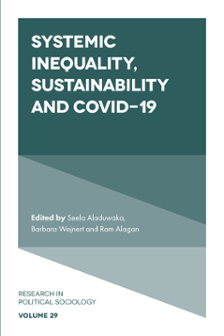
Index
Systemic Inequality, Sustainability and COVID-19
ISBN: 978-1-80117-733-7, eISBN: 978-1-80117-732-0
ISSN: 0895-9935
Publication date: 30 May 2022
Citation
(2022), "Index", Aladuwaka, S., Wejnert, B. and Alagan, R. (Ed.) Systemic Inequality, Sustainability and COVID-19 (Research in Political Sociology, Vol. 29), Emerald Publishing Limited, Leeds, pp. 269-281. https://doi.org/10.1108/S0895-993520220000029004
Publisher
:Emerald Publishing Limited
Copyright © 2022 Seela Aladuwaka, Barbara Wejnert and Ram Alagan. Published under exclusive licence by Emerald Publishing Limited
INDEX
- Prelims
- Part I Heath and Social Inequality and COVID-19
- Social Determinants of Health Disparities and COVID-19 in Black Belt Communities in Alabama: Geospatial Analyses
- A Naturalistic Observation of Mask Wearing Behavior in a Southeastern United States Town during the COVID-19 Pandemic
- Selected Aspects of Discrimination against the Elderly in the Polish Health Care System
- Invisible Frontline Warriors of COVID-19: An Intersectional Feminist Study of ASHA Workers in India
- Impact of COVID-19 on Employment in Himachal Pradesh – A Case Study
- Gender-Based Violence and COVID-19: Legislative and Judicial Measures for Protection and Support of the Women Victims of Domestic Violence in Sri Lanka
- Gender Relations and Dynamics of Internal Committee: Case Studies from Private and Public Institutions in South India
- Care Ethics in the Time of COVID-19: Are We Our Brother's Keepers? Some Insights from the Efforts of “Food for Chennai,” India
- Iranian Dating Sites in the Age of COVID-19 Pandemic: A Phenomenological Study on Muslim Married Women
- Part II Environment, Sustainability, and COVID-19
- A Reflection on Biodiversity in a Time of Covid-19 Pandemic: A Foundation of Environmental Sustainability
- Systemic Inequality, Sustainability and COVID-19 in US Prisons: A Sociological Exploration of Women's Prison Gardens in Pandemic Times
- COVID-19 in Chile: Personal and Political Outcomes
- Corporate Mining, Sustainable Development, and Human Rights of the Indigenous People in the Philippines: Implications for Building Resiliency to the Impacts of COVID-19 Pandemic
- Genealogies of Sustainable Development? Life Stories of Frugal, Inventive, and Creative Women
- Birdsong and the Diseased Gaia in the Anthropocene: An Ecofeminist Reading of Terry Tempest Williams' Memoirs – Refuge: An Unnatural History of Family and Place and When Women Were Birds: Fifty-Four Variations on Voice
- Index